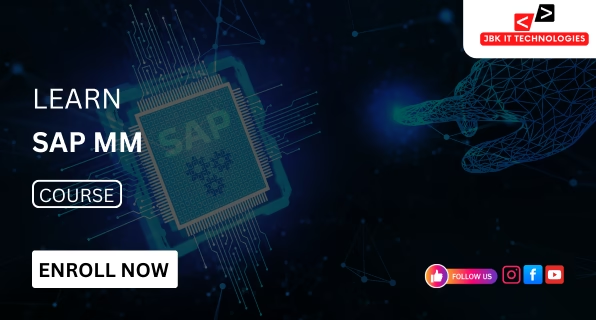SAP MM Training Institutes In Dilsukhnagar Hyderabad
JBK IT Technologies is one of the SAP MM Training Institutes in Dilsukhnagar Hyderabad, offering practical training.

Course Overview
SAP MM (Material Management) is one of the most essential modules in SAP ERP used for procurement and inventory management. It plays a crucial role in supply chain management, production planning, and logistics functions of an enterprise. At JBK IT Technologies, we offer a comprehensive and practical SAP MM course in Dilsukhnagar Hyderabad that equips learners with real-time industry knowledge and hands-on experience. Our SAP MM training is designed by professionals with deep domain expertise and focuses on both the functional and technical aspects of the module. The course covers everything from procurement processes, master data management, purchase requisitions, purchase orders, inventory management, to invoice verification and reporting. Whether you are a fresher looking to enter the SAP domain, or a working professional aiming to upskill in supply chain operations, our SAP MM training in Dilsukhnagar Hyderabad is structured to match your career goals. We follow a case-study based approach and provide practical labs, real-time project scenarios, and placement assistance to make sure you’re job-ready. JBK IT Technologies stands out as one of the best SAP MM training institutes in Dilsukhnagar Hyderabad, with branches in Ameerpet, Dilsukhnagar, and Mehdipatnam. With a focus on quality learning and expert mentorship, we aim to deliver training that adds real value to your professional journey. Best Sap MM Training Institute In Dilsukhnagar Hyderabad.
Description
The SAP MM (Material Management) course at JBK IT Technologies is a job-focused training program designed to help you master the key concepts, configurations, and functionalities of the SAP MM module. As one of the most critical components in the SAP ERP suite, SAP MM is responsible for streamlining the procurement and inventory processes across various industries. This course is structured to help learners gain an in-depth understanding of material planning, vendor evaluation, purchasing, inventory control, and invoice verification within the SAP MM framework. Our training includes hands-on practice, real-time use cases, and workflow scenarios to ensure that students not only learn the theory but also understand how to apply it in a live business environment. What sets our SAP MM training in Dilsukhnagar, Hyderabad apart is our industry-aligned curriculum, experienced faculty, and personalized attention. From day one, learners are guided through the SAP interface, taught how to configure the module, and exposed to practical scenarios used by MNCs and large enterprises. Whether you are looking to begin a career in SAP, switch to the functional domain, or upgrade your ERP skills, this course gives you the tools, knowledge, and confidence to succeed. JBK IT Technologies offers flexible batches across Ameerpet, Dilsukhnagar, and Mehdipatnam, with classroom and online options available—the best SAP MM Training Institute in Dilsukhnagar, Hyderabad.
Course Curriculum
1. Introduction to SAP & ERP
▪ Overview of SAP
▪ SAP Modules & Architecture
▪ Navigation and SAP GUI basics
2. SAP MM – Overview & Role in Supply Chain
▪ Introduction to SAP MM Module
▪ SAP MM Integration with SD, PP, and FICO
▪ Organizational Structure in SAP MM
▪ Enterprise Structure Configuration
3. Master Data Configuration
▪ Material Master
▪ Vendor Master
▪ Purchasing Info Record
▪ Source List & Quota Arrangement
4. Procurement Process
▪ Purchase Requisition
▪ Request for Quotation (RFQ)
▪ Quotation Processing
▪ Purchase Order (PO) Creation
▪ Outline Agreements – Contracts & Scheduling Agreements
5. Goods Receipt & Inventory Management
▪ Goods Receipt (GR) for PO
▪ Movement Types in Inventory
▪ Reservations & Transfer Postings
▪ Stock Transfers – Inter & Intra Company
▪ Physical Inventory Processing
6. Invoice Verification
▪ Logistics Invoice Verification
▪ Invoice Blocking & Release
▪ Subsequent Debit/Credit
▪ Integration with Accounts Payable
7. Valuation & Account Determination
▪ Valuation Types & Valuation Areas
▪ Automatic Account Determination
▪ Price Control (Standard vs Moving Average)
▪ Split Valuation
Who can learn this course
The SAP MM course at JBK IT Technologies is ideal for anyone who wants to build a strong career in supply chain management, procurement, or ERP consulting. No prior SAP knowledge is required to start, and the course is designed to support learners from all educational and professional backgrounds.
1. Fresh Graduates (B.Com, B.Sc, BBA, BCA, MBA, MCA, etc.)
If you’re a recent graduate and looking to kick-start your career in IT or operations, SAP MM gives you a specialized skill that is in high demand across industries. It can open up entry-level roles such as SAP MM associate, support consultant, or functional trainee.
2. Working Professionals
Professionals from domains like supply chain, procurement, inventory, warehousing, or logistics can take this course to transition into SAP-based roles. It is especially valuable for those looking to upgrade their careers with ERP systems knowledge.
3. Finance & Logistics Executives
If you already work in purchase, store, or vendor management and use manual or legacy systems, learning SAP MM will help you modernize your workflow and improve process efficiency.
4. Job Seekers & Career Switchers
Looking to change your career into a more stable, high-paying domain? SAP MM is a core functional module with strong placement potential, especially in Hyderabad, Bengaluru, Pune, and other metro cities.
5. Entrepreneurs & Business Owners
If you manage a small or mid-size manufacturing or trading business, understanding SAP MM will help you optimize your purchase, stock, and billing processes.
Upcoming Batches
| Course Name | Start Date | Mode | Timing | Enroll |
|---|---|---|---|---|
| Advanced Excel | 23/02/2026 | Online/Offline | 02:00 PM | Book Slot |
| Advanced Excel | 23/02/2026 | Online/Offline | 11:00 AM | Book Slot |
| Tally | 23/02/2026 | Online/Offline | 03:00 PM | Book Slot |
| Photoshop | 23/02/2026 | Online/Offline | 12:00 PM | Book Slot |
| Sap Fico | 23/02/2026 | Online/Offline | 05:00 PM | Book Slot |
| Java | 23/02/2026 | Online/Offline | 05:00 PM | Book Slot |
| Python | 23/02/2026 | Online/Offline | 06:00 PM | Book Slot |
| Advanced Excel | 23/02/2026 | Online | 08:00 PM | Book Slot |
Training Features

ISO Certified institute offering quality training and industry-recognized certification.

Industry experts with real-time project experience and teaching excellence.

100% placement support with interview preparation and resume building.

Hands-on training with practical, business-oriented Excel assignments.

Interview practice sessions to boost confidence and job readiness.

Interactive sessions for real-time query resolution and concept clarity.
Hiring Clients














Student Testimonials
Recently Placed Students





FAQ'S
Most Popular Questions
SAP MM (Material Management) is a core module in the SAP ERP system that handles procurement, inventory, and materials management processes. It is essential for organizations to manage supply chain and inventory effectively and is in high demand across industries.
No. SAP MM is a functional module, and it is designed to be learned by individuals from both technical and non-technical backgrounds, including commerce, business administration, and supply chain management.
There are no strict prerequisites. However, basic understanding of business processes or supply chain concepts can be helpful. Our trainers cover every topic from scratch to ensure all learners are on the same page.
Yes. JBK IT Technologies offers both classroom and online SAP MM training with live interactive sessions, access to SAP systems for practice, and recorded session support for revision.
After completing the SAP MM course, you can apply for roles such as SAP MM Associate Consultant, SAP MM End User, SAP Functional Analyst, Procurement Executive, Material Management Specialist, and more.
Yes. Every student gets access to the SAP ERP server for practical sessions. You will be trained on real-time business scenarios to help you understand how the system works in corporate environments.
